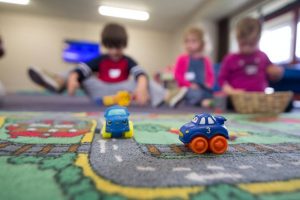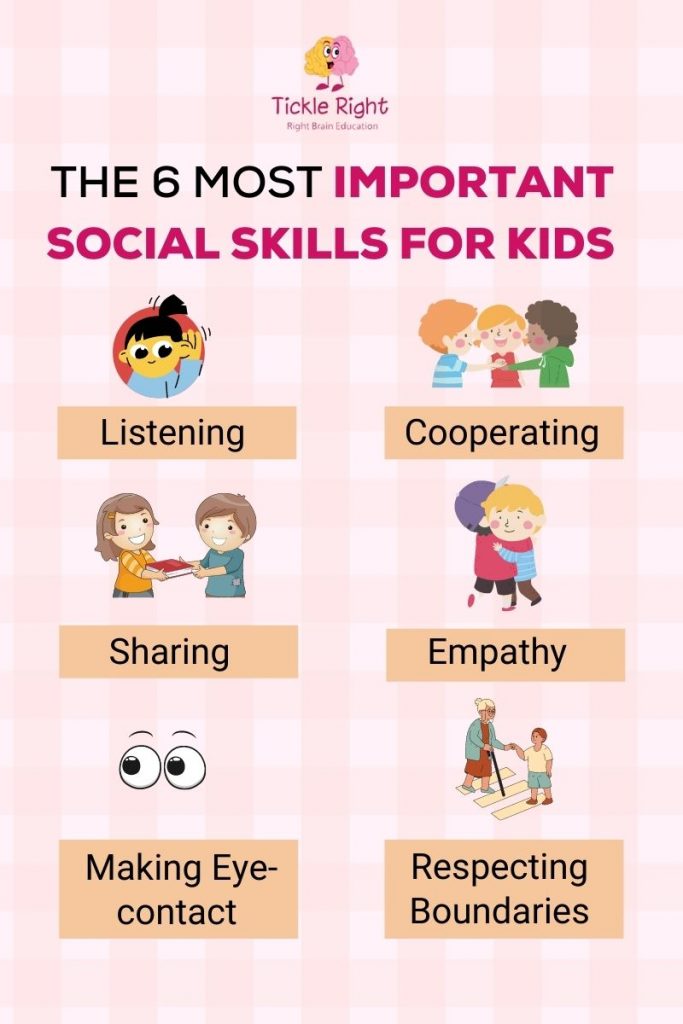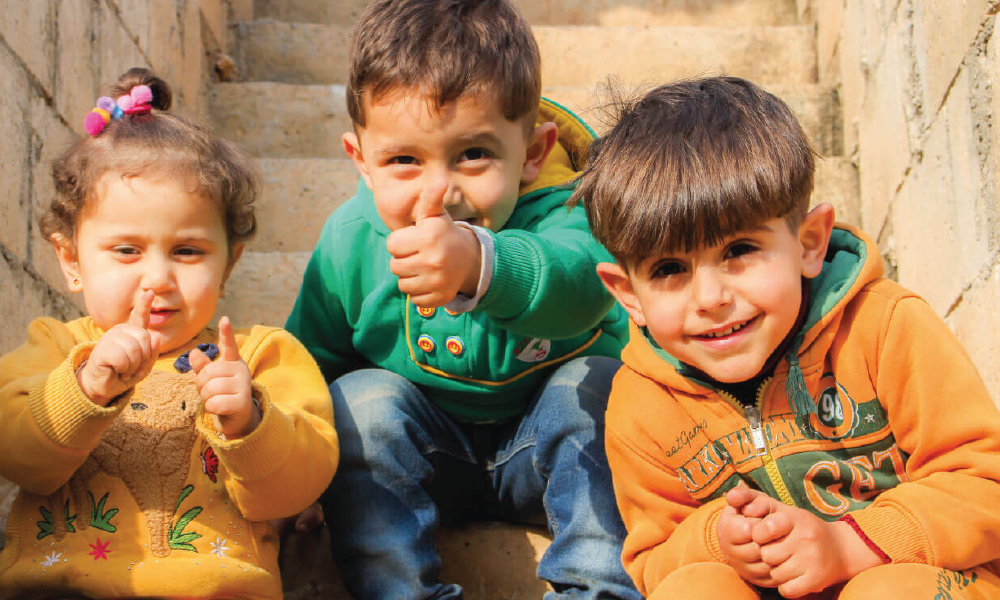Raising a 5-year-old is a whirlwind of curiosity, boundless energy, and constant learning. At this age, children are stepping into school life more independently, building friendships, and beginning to develop
6 Most Important Social Skills For Kids At An Early Age
6 Most important Social Skills For Kids At An Early Age
The ability to contemplate feelings, manage responses, & express emotions fall duly under the umbrella of excellent social skills. These skills bestow power in a child’s behavior. In a way, it helps initiate conversations, read facial expressions, & strengthen their communication skills with the faces around them. And as your child’s first role model, it’s your duty call to expose your little one to a responsive environment where they can interact easily.
Besides, there’s no doubt about how important social skills are for a child’s overall development. A child only develops their senses when they are exposed to surroundings where they can play, explore, learn, & even get irritated, bringing about all kinds of reactions. In general, it’s easy for some children to get along over time, but for some, it may still be difficult to speak to their peers. And you can help your child be more comfortable around unfamiliar people by following the tips mentioned ahead.
We at Tickle Right assert the crucial importance of social skills in our Right Brain Training Program. There are also several other skills associated with the understanding of social skills. That includes developing empathy, profusing confidence, inculcating a habit of sharing, & setting boundaries while communicating with peers around.
What Are Social Skills For Kids?
Social skills for kids can be referred to as a set of skills crucial for daily interaction & understanding of expressions. It also involves strengthening a child’s language aptitude for enriched social-emotional development. While helping a child develop some fundamental social skills, the focus stays on both verbal & non-verbal communication. Your child will come through these skills with just effort, the right means, & practice.
These skills have the potential to transform your child into a social butterfly. And if not that, surely some social & emotional independence as they grow up over time. The ability to express themselves well caters to every child’s social needs & personal requirements. It is the direct means of connecting with people, making new friends, handling conflicts, expressing your wishes, & others. In short, it helps your child to read social cues & respond well to them.

Importance Of Social Skills For Kids
Having a robust set of social skills can foster a wholesome personality for your little one. It is just not limited to social development, instead caters to other rich experiences to help your child connect with both like-minded & varying interests of peers. This further impacts a child’s success & emotional well-being in every way. And subconsciously a child is born with the brilliance to connect with people, you still have to help brush these skills over time. Here’s how social skills can assist your child:
- Develop linguistic proficiency – Basic language skills include listening, speaking, reading, & writing. These skills help a child communicate with the world by improving their speech & the ability to connect & understand other people’s emotions.
- Self-confidence – It’s crucial that your child feels positive & good about themselves. At this age, you must expose your child to all sorts of fun experiences & encourage them to try out new things. This way they get to interact with a bunch of positive people which helps them build confidence.
- Improves learning power – Sound social skills also nurture a child’s best interests & talents. Which makes it almost impossible to avoid communicating & learning something new simultaneously. This also impacts how your child will grow in a learning environment & connect with their classmates as a preschooler.
- Inculcates problem-solving – Strong communication skills & a better understanding of any situation help resolve conflicts with peers. Such situations usually involve brainstorming & analyzing what’s best for everyone helps develop empathy & decision-making skills.
- Positive Mindset – A positive mindset lays the foundation for healthy early relationships. This is a mental & emotional attitude that helps concentrate on the good side of the situation. Therefore, with a positive mindset, your child will be able to develop great social skills & approach situations with confidence.
How To Improve Your Child’s Social Skills?
Your child is often surrounded by familiar & strange faces all the time. However, they begin to interact with their facial expressions, smiles, fussiness, & crying at a young age. As parents, you can leverage this opportunity to teach your kids to understand social cues, common languages, & listening skills over time. It’s essential that your child grows & develops communication proficiency with the right methods.
Therefore, here’s how you can improve your child’s social skills who are struggling to interact with peers around them:
-
Be Your Child’s Role Model
Always be present during your child’s developmental years. It’s a normal tendency of many children to imitate their parent’s actions & words. That means your child is watching your behavior all the time. And that’s why it becomes important to think about how you interact with others around you. Encourage your child to interact with you & build on conversations that involve expressing any kind of emotion.
-
Speak Your Common Langauge
Speaking your common language around your little one helps develop a solid foundation of linguistic proficiency. Your child is a born linguistic master! And you must not forget it. This is another way how you can introduce your local language to your child. Children learn to pick up a few words by they are 9 months old. And you can go the extra mile by engaging in the same language that you want them to start speaking.
-
Foster A Positive Environment
An optimistic environment around your child helps develop a positive attitude & overall social skills proficiency. It gets easier for your child to make friends in the classroom & elsewhere by building upon skills like teamwork, sharing & emotional competency. Owing to such skills, the environment around your little one should be such that helps them express themselves without any hesitation. But this must also give them the understanding to respect others’ boundaries & set theirs as well.

-
Teach Empathy
Your little one must have a keen understanding of developing empathy. This suggests how someone else is feeling & how these emotions can help your child plan their next response. You can assert its importance via sharing experiences, scenarios, & by making stories related to emotional intelligence. This also involves familiarizing your child with both positive & negative feelings with their impact on the particular scenario. As you share such experiences, this helps your child see others’ perspectives & even builds strong listening skills by focusing on the conversation.
-
Encourage Social Interaction
Interaction with peers inside & outside of the family helps build confidence to engage with others without hesitation. You must encourage your little ones to indulge in extracurricular activities that match their interests. This will also help them speak to like-minded kids. You can consider this as a stepping stone towards socializing with those with different interests. Help your child interact but also demonstrate how important it is to respect other people’s boundaries.
-
Inspire To Ask Questions
Children are usually curious about a lot of things at this age. And it might amaze you but you can turn their curiosity into effective social development. Some children put up questions as a response to their curiosity. However in other cases, when a child gets nervous to put forward questions, you must help them must develop positive conversations. Make sure that they are listening carefully to you. The best way to turn the tables here is by also letting your child speak & making them feel important, thereby inspiring them to engage with you.
The 6 Most Important Social Skills For Kids
Working on developing social skills with your child can impact everything for them. From their experience in school to advancing in a work environment someday, your child will come across various scenarios. And it’s important to prepare your child for such situations beforehand. Young children have the potential to retain information & with the right guidance, they’ll adapt to the following skills in no time.

-
Listening
The habit of active listening plays a crucial role in developing good social skills. These skills help a child develop responsive speaking & listening skills. Besides, listening is not about being quiet while others are talking. It’s more about comprehending others’ emotions & answering accordingly. It helps take the conversation in the right direction & build healthy communication.
-
Cooperating
Cooperating means the ability of children to work together to attain common goals & natural empathy. Your child may encounter several challenges while working & engaging in regular activities within a group of peers. Trying to put across a cooperative behavior here will foster better communication & fewer conflicts. Your child will develop skills like teamwork, sharing, & empathy.
-
Sharing
A child’s willingness to share their favorites reflects effective collaboration, negotiation, & sharing skills. And as they say, sharing is caring, you must focus on your child’s behavior to instill these skills at an early age. In some cases, children may feel reluctant to share resources & are often selfish by 3-6 years. But with growing age & advancing cognitive development, your child will be happy to share things & present their affection towards their peers.
-
Making Eye-contact
Maintaining good eye contact is another important aspect of wholesome social development. It displays a child’s interest in a conversation & helps them express a variety of emotions through non-verbal eye contact. Let’s understand the importance here, a good eye contact will make your child more persuasive & reflects attentiveness. It’s a sign that your child is truly engaged in a conversation. Let alone, it is difficult for some kids to maintain eye contact but chances are high if it’s done for 4-5 seconds at a time.
-
Empathy
Empathy means the emotional intelligence related to a child’s understanding of a particular situation. You can help your child acquire these skills by sharing experiences & stories that validate others’ emotions. Whenever your child is expressing an emotion, make sure to pay attention to them. Give a response acknowledging it so that your child understands the true sense of responding correctly via reflecting empathy.
-
Respecting Boundaries
Respecting others’ boundaries is another critical facet of social refinement. You cannot change completely a child’s basic nature, but at this age, you can transform it for the better. If your child is outspoken or an extrovert, they may be comfortable with a lot of things that others might not. For instance, long conversations, hugs, and others. Let your child understand the importance of setting boundaries & respecting others’ physical & emotional boundaries as well.
FAQs

-
What are children’s social skills?
Children’s social skills are the everyday social skills that they require for everyday interaction & to develop linguistic brilliance as they grow up. Some of these skills include:
- Listening
- Sharing
- Communication
- Empathy
- Eye-Contact
- Confidence
- Cooperation
- Problem Solving
-
What are some examples of social skills?
Good social skills come around for a child if the right methods are used for inculcating these skills. As parents, you must understand that your child’s future is also associated with these skills. The good news is Right Brain Training activities help children make the best of their potential & talent to instill these skills. Some examples of such skills include:
- Active Listening
- Empathy
- Problem-Solving Approach
- Verbal Fluency
- Ability To Cooperate
- Asking Questions
-
What causes poor social skills?
Lack of poor skills can be associated with several factors like:
- Anxiety
- Nervousness
- Shyness
- Being Bullied
- Attention Deficit Hyperactivity Disorder (ADHD)
Takeaway
Inculcating social skills has a wide range of benefits for your kids. These skills have the potential for better educational outcomes & stronger connections with peers around. Not having the right social skills to engage with people can lead to relationship problems, conflicts, misunderstandings, & others. But it’s never too early to begin training for social development. A willingness to interact with people correctly will do wonders for your little kid. It shall amaze you with their emotional maturity & success at later stages.

